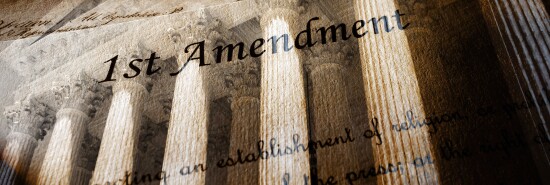
How long can the First Amendment survive the new, unwritten woke blasphemy laws?
Dan Hannan
Every society seems to need taboos, no-go areas, de facto blasphemy laws. How the United States has kept its secular constitution as long as it has is a wonder. In any other circumstance, I might call it a miracle.
American secularism differs from, say, French secularism. In the U.S., secularism means that no sect gets a privileged legal position. As the Constitution puts it, “Congress shall make no law respecting an establishment of religion, or prohibiting the free exercise thereof.” It also states, “No religious Test shall ever be required as a Qualification to any Office.”
In France, secularism means that faith should be driven from the public space, so that, for example, prisons ought not to offer kosher or halal meal options to inmates.
I prefer the American version, but I worry about how sustainable it is. Sure, no one gets into trouble these days for making a bad joke about Jesus. But what about someone who makes a bad joke about, say, George Floyd? At what point would social ostracism and professional harassment spill over into official discrimination?
It is already happening in Britain. Tony Blair’s government took the last blasphemy laws off the statute books in 2008. Precisely from that moment, people began to be persecuted for offending against the values that a post-Christian society had sacralized. A homophobic or misogynistic tweet could result in your collar being felt. It was as if, having toppled God, people needed to erect something in his place. That something turned out to be the creed of identity politics.
Britain has just experienced the kind of de facto blasphemy case that would associate with backward villages in Pakistan. A 14-year-old boy brought a copy of the Quran to school in the northern English town of Wakefield, apparently after losing a bet. No, I don’t get it either, but 14-year-old boys do odd things. At some point, the book was dropped and scuffed, whereupon all sorts of rumors took off about the Quran having been desecrated or burned. The child, who is severely autistic, began getting death threats from fellow students.
What happened next is almost unbelievable. Instead of suspending the pupils who were threatening violence, the school suspended the pupil who had brought in the Quran. What offense he had committed remains unclear. Dropping a book — even tearing it up, had he chosen to do so — is not against any school rule. Indeed, the school said in a statement that there had been “no malicious intent” behind the wear and tear. But upsetting some religious minorities offends against both kinds of blasphemy, both the traditional variety and the modern anti-racist sort.
The boy’s mother, who, like her son, is non-Muslim, came to the local mosque as a penitent, her head covered, and stammered out an apology. A Labour councilor, ostensibly calling for calm and dispelling rumors of deliberate damage, declared that the child had “rightfully so” been excluded from school and praised his mother for not prosecuting those threatening him with death. Shockingly, a local police officer sitting alongside him told the congregation that his force had logged “a hate incident.” No, not the death threats — the book-scuffing. Again, why? What law was broken?
One sympathizes with the boy’s mother. A teacher in the neighboring town of Batley has still not come out of hiding two years after showing his class a cartoon of the Prophet Muhammed in a lesson that was, of all things, about free speech. What is most disturbing about these cases is not the bellicosity of the extremists but the way in which police amplify their voices, to the horror of those Muslims who fear their faith is getting a bad name.
To be clear, the authorities are not acting out of religious sensitivity but out of concern for unofficial, nonreligious blasphemy codes, the codes that saw a former policeman jailed for mocking George Floyd in private messages and saw a teenager jailed for six weeks for tweeting abuse at a black footballer. Because race trumps everything else, Muslims are seen primarily as representing an ethnic minority, not a religion.
The journalist Jess Gill skewered the hypocrisy of the new blasphemy code by asking students on camera whether they thought free speech mattered more than religious tolerance. Oh, yes, they’d say. So, she’d ask, would it be OK to burn a Bible? Yup, absolutely. And what about a Quran? No, uh, that’s different because … um, something or other.
British students answered as American students would. The reason those American students have not gotten the authorities to enforce their intolerance is that the First Amendment somehow still stands. But for how much longer?
